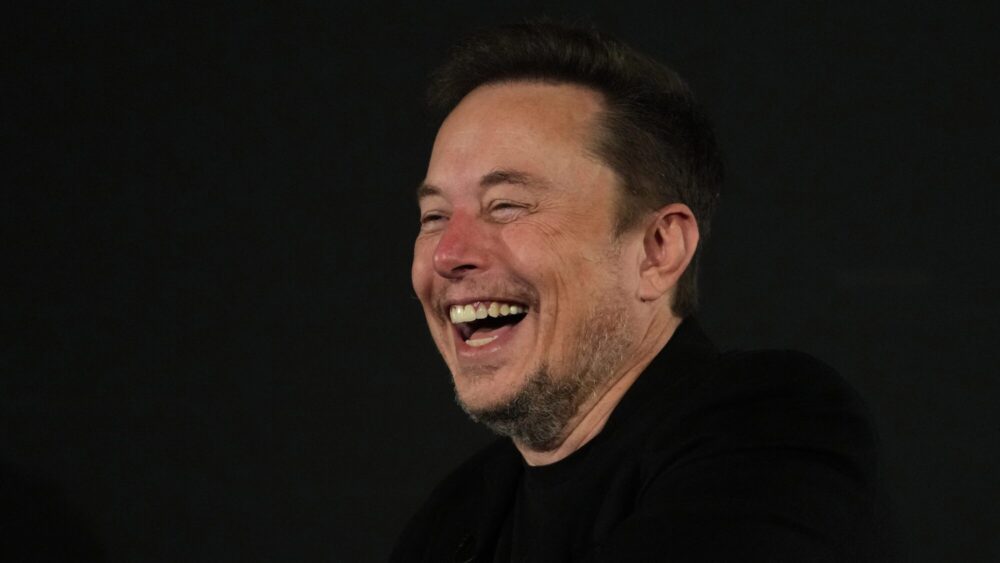
Elon Musk smiles during an in-conversation event with Britain’s Prime Minister Rishi Sunak
Kirsty Wigglesworth / POOL / AFP
The European Union has a love-hate relationship with Elon Musk.
After threatening to shut down European operations of his social media platform X (formerly Twitter), it has now turned to his other X enterprise, SpaceX, to launch its satellites into outer space.
The EU will be paying Musk’s company €180 million for two launches next year—one in April and one in July, sources confirmed to Politico. The move is an act of desperation in the face of setbacks in developing new satellite launching equipment for European space programs and the EU’s loss of its lead in the field.
“We have four satellites to launch next year,” Internal Market Commissioner Thierry Breton told reporters on the sidelines of a ministerial meeting in Seville on November 6. “And given that Ariane 6 is still not going to be available, I accepted a proposal from the European Space Agency to use SpaceX.”
The meeting in Seville convened economy ministers from Italy, France, and Germany—the continent’s leaders in space technology hardware—as well as the European Space Agency (ESA), precisely to discuss problems with a lack of European options with getting satellites into orbit.
While France has a lead role in European space programs, the programs are run by the European Space Agency, which is not an EU institution. Founded in 1975, it’s an intergovernmental organization that 22 countries, including the UK, belong to and fund with an annual budget of about €7.08 billion. With its headquarters in Paris and a spaceport in Kourou, French Guiana, it operates space missions, both manned and unmanned.
One of the most important projects of the ESA is its role in Galileo, Europe’s Global Navigation Satellite System (GNSS). Operated by the European Union Agency for the Space Programme (EUSPA), headquartered in Prague, Czechia, Galileo is the European equivalent of the American GPS or the Russian GLONASS systems. Operational since 2016, it means European countries and the EU don’t have to rely on US satellite systems for their military and political satellite mapping and communications. Of course, keeping it operational requires getting satellites into outer space, which the ESA does—or rather, did.
Europe was once the global leader in space rocket launches. Between 2015 and 2019, the French company Arianespace had 40% of the $7.5 billion commercial launch market, according to Euroconsult, but it has now been far surpassed by private companies such as SpaceX.
The fatal error occurred in 2014 when the French company decided not to take the path followed by entrepreneurs like Musk to develop a launch vehicle with reusable parts. Though the Ariane 6 launcher has lower launch costs than its predecessor, the Ariane 5, the reusable technology used by SpaceX and other space programs has proven not only workable but even cheaper.
The technical decision haunts French economy minister Bruno Le Maire to this day.
“The European space adventure is magnificent, but in 2014 there was a fork in the road, and we didn’t take the right path,” Le Maire said at a conference last September. “We should have made the choice of the reusable launcher. We should have had this audacity.”
On top of that, the Ariane 6 launcher has faced constant delays in development and production since 2020, not only adding up costs but now putting European satellite capabilities at risk.
“We had a calendar which was promised and not kept to,” Breton said of the still-in-development Ariane 6 rocket launch vehicle. “There were delays again and again. Because of these delays, we had to make certain decisions.”
Launching the satellites from U.S. infrastructure will also require a security agreement, still to be negotiated with the U.S., so that European engineers can be assured around-the-clock access to the satellites and the right to retrieve technology should the rocket fail and be lost at sea.
“We’re talking about critical satellites, so we’re still negotiating with the U.S. side,” said Breton.
SpaceX is not the only American private space company the EU has considered working with. The United Launch Alliance, an aerospace endeavor of the industrial-military hardware giants Boeing and Lockheed Martin, was also a possibility.
From the meeting in Seville, ministers and the ESA hope to have laid the foundations to reboot the European space sector to make it competitive again and avoid having to ask Elon Musk for more favors.
